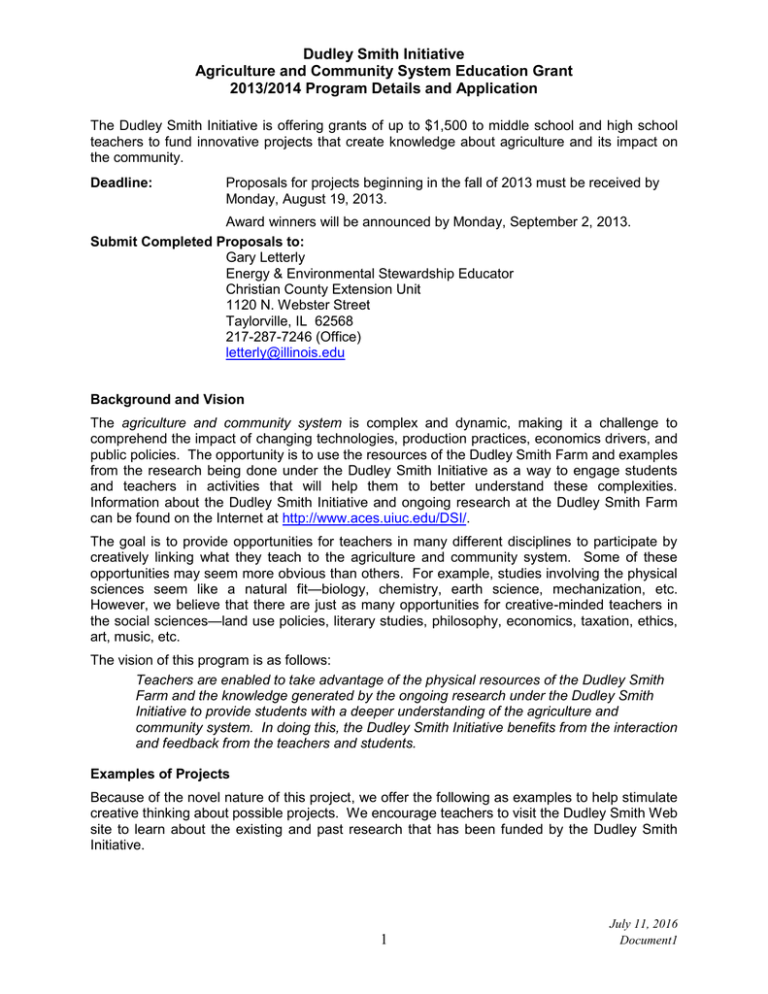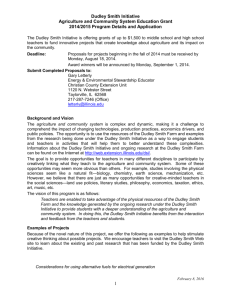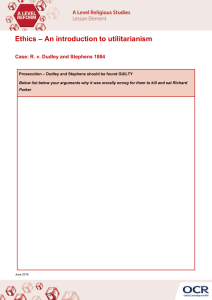Dudley Smith Initiative Agriculture and Community System Education Grant
advertisement

Dudley Smith Initiative Agriculture and Community System Education Grant 2013/2014 Program Details and Application The Dudley Smith Initiative is offering grants of up to $1,500 to middle school and high school teachers to fund innovative projects that create knowledge about agriculture and its impact on the community. Deadline: Proposals for projects beginning in the fall of 2013 must be received by Monday, August 19, 2013. Award winners will be announced by Monday, September 2, 2013. Submit Completed Proposals to: Gary Letterly Energy & Environmental Stewardship Educator Christian County Extension Unit 1120 N. Webster Street Taylorville, IL 62568 217-287-7246 (Office) letterly@illinois.edu Background and Vision The agriculture and community system is complex and dynamic, making it a challenge to comprehend the impact of changing technologies, production practices, economics drivers, and public policies. The opportunity is to use the resources of the Dudley Smith Farm and examples from the research being done under the Dudley Smith Initiative as a way to engage students and teachers in activities that will help them to better understand these complexities. Information about the Dudley Smith Initiative and ongoing research at the Dudley Smith Farm can be found on the Internet at http://www.aces.uiuc.edu/DSI/. The goal is to provide opportunities for teachers in many different disciplines to participate by creatively linking what they teach to the agriculture and community system. Some of these opportunities may seem more obvious than others. For example, studies involving the physical sciences seem like a natural fit—biology, chemistry, earth science, mechanization, etc. However, we believe that there are just as many opportunities for creative-minded teachers in the social sciences—land use policies, literary studies, philosophy, economics, taxation, ethics, art, music, etc. The vision of this program is as follows: Teachers are enabled to take advantage of the physical resources of the Dudley Smith Farm and the knowledge generated by the ongoing research under the Dudley Smith Initiative to provide students with a deeper understanding of the agriculture and community system. In doing this, the Dudley Smith Initiative benefits from the interaction and feedback from the teachers and students. Examples of Projects Because of the novel nature of this project, we offer the following as examples to help stimulate creative thinking about possible projects. We encourage teachers to visit the Dudley Smith Web site to learn about the existing and past research that has been funded by the Dudley Smith Initiative. 1 July 11, 2016 Document1 Considerations for using alternative fuels for electrical generation Current research on the DS farm involves the production of Miscanthus and switchgrass. What are the tradeoffs of using these as an alternative to coal-fired electrical generation plants (social, economic, environmental, operational, etc.)? The impact of production enterprise type on the family Current research on the DS farm involves integration of livestock (cattle) into cropping systems. How does the change in enterprise type impact the families who farm that land? The impact of production enterprise on the local economy Current research on the DS farm involves looking at alternative cropping and livestock enterprises. What would the impact be if a significant number of farmers in the area shifted to these enterprises? Could we heat our houses with grass? Current DS research is looking at the feasibility of small-scale applications of direct fired heating systems which burn Miscanthus or switchgrass for individual residences, businesses, or schools. In fact, a demonstration furnace is being installed at the Christian County Extension office. What are the advantages of burning grass to heat our homes? Doesn’t burning stuff add to carbon emissions? Are these furnaces safe? Does it smell? What are the economics of burning grass instead of gas? Can I start saving grass clippings and burn that too? The impact of alternative cropping systems on water quality Recent DS research looked at how different crops and production practices impact soil nutrient quality. What is a watershed? How might these different systems impact the quality of water in our community or of bodies of water that are fed by our watershed? Why are some practices ok in one place, but not another? What are the advantages of locally grown foods? Recent DS research looked at the patterns and trends in locally grown foods. There are many social, political, and economic implications to growing and consuming foods on a more localized basis. What percent of our food is currently grown and consumed locally? How far does food typically travel before we eat it, and why should we care? Why don’t we grow all of our food locally? Is food grown on small local farms safer than food from other places? Uses of Funding The grant funds can be used for: Travel—primarily for visits to the Dudley Smith Farm, but other travel may qualify if appropriate. Purchase of consumables—for experiments and demonstrations. Purchase of supplemental text—that can augment existing textbooks. 2 July 11, 2016 Document1 Evaluation Criteria The following factors shall be weighed as indicated to establish a numerical rating for all proposals submitted: 30% Creativity in building knowledge about the linkages of agriculture to the community 25% How well the project relates to existing (or past) DSI research 20% Use of physical resources at the farm 15% Ability of the learning experience to be re-used in following years or shared with others 10% Number of students involved Other Activities and Obligations Dudley Smith Day—this is a meeting where DSI researchers provide an update on the status of their work to the Dudley Smith Research Advisory Committee. Other researchers and interested parties are also invited to participate and learn more about the DSI programs. We highly encourage teachers who receive education grants to participate in this event as it will provide an opportunity to meet with researchers and identify resources that may enhance your project. In the past, DSI Education Grant recipient teachers and students have made presentations at these meetings to inform the community about their work as a part of their project. Education Grant Project Report—a brief “report” summarizing the project will be submitted at the end of the project (May 31). Please note that this report is a very important obligation of the grant recipient. The purpose of this report is to provide a summary of the experience and to help guide future activities. The goal of this is not to generate a time-consuming activity for the teacher, rather to provide accurate feedback to the DSI grant reviewers. We encourage the teachers to involve the students in summarizing what they learned and what questions were raised. Content from these reports is used for the DSI web site. 3 July 11, 2016 Document1 PROPOSAL CONTENT School Information Teacher’s Name(s): Email Address: Grade Level: 4th 5th 6th 7th 8th Check all that apply Freshman Sophomore Junior Senior Subject Areas: math, literature, biology, etc. Name of School: Phone: School Address: City: State: Zip: Title of Project: Project Summary: 100 words or less Primary Learning Objectives: What do you want your students to learn? 4 July 11, 2016 Document1 Summary of Activities and Timeline: How These Activities Will Accomplish the Objectives: Preparation: Describe what you will do to prepare your students for the experience. Project Activities: Describe how and where you will do activities. Reflection/Communication: Explain how students will share project results with other students and/or schools. 5 July 11, 2016 Document1 Number of Students: Others Who Will Learn from This Effort: Method of Project Evaluation: Expected Results: What will happen as a result of the project? 6 July 11, 2016 Document1 Budget (Please itemize your anticipated costs in the table below) Expenditure Grant Funds Other/Matching Total Personnel (substitute teachers, resource experts) Description: Transportation (e.g. bus) Description: Materials/supplies Description: Fees Description: List other: 1. 2. 3. Totals Budget Narrative: Provide a brief description of how the funds will be used (100 words). 7 July 11, 2016 Document1




